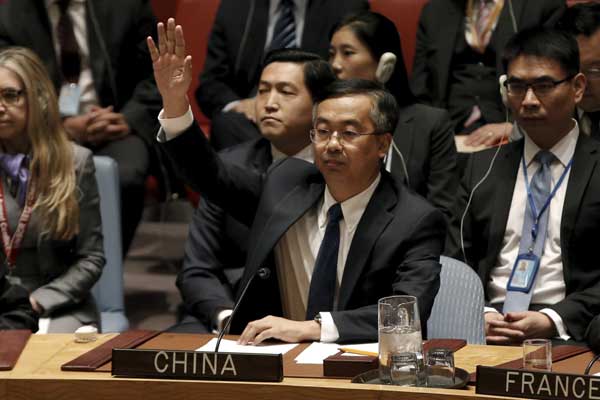Human Rights Watch once again shows its bias
By Li Yunlong (China Daily) Updated: 2016-02-17 08:16
 |
|
Chinese Deputy Permanent Representative to the United Nations Wang Min casts his vote during a meeting of the United Nations Security Council at UN headquarters in New York, December 10, 2015. [Photo/Agencies] |
In its report on world human rights 2016, New York-based Human Rights Watch once again criticized the freedom of religious belief in China.
China's Constitution and laws on elections, social organizations, education, labor, and advertisements, among other things, have clear rules protecting citizens' freedom of religious belief under the principle of non-discrimination. Article 251 in the Criminal Law clearly stipulates the punishments for violating citizens' freedom of religious belief.
Since China's reform and opening-up in the late 1970s, the Chinese government has paid special attention to protecting citizens' freedom of religious belief, so as to adapt the development of religious affairs to the practical needs of a fast developing society.
All legal religious organizations have built a large number of religious activity sites to meet the needs of their believers. In 1995, there were 77,981 religious sites for Buddhist, Taoist, Muslim and Christian. The number rose to more than 140,000 in 2012. And China has developed a comparatively complete religious education institute system, from which more than 40,000 people have graduated.
China now has more than 5,500 religious organizations. These organizations offer various religious service jobs to more than 360,000 people, among whom 200,000 are Buddhist, 50,000 are Taoist, 45,000 are Muslims, and about 50,000 are Christians. It is illegal to intervene in their regular daily religious activities. These religious organizations have also published a large amount of books and religious materials.
In China, all citizens can freely choose their own religious beliefs, express their beliefs and take part in religious activities. The social environment is constantly improving for the prosperity of religion in China, and society has becomes more and more objective and reasonable toward religions.
The criticizing of the freedom of religious belief in China by Human Rights Watch is a product of subjective bias and prejudice, and has no foundation in reality. The cases it quoted in its report are only some common criminal cases processed by China's judicial authority, which are not related to religious belief.
They are some cases of superstition and fraud. Some so-called religious leaders in the report are actually violators of public order, swindlers or rapists, hiding behind the disguise of religion. The trials of these people have been transparent and strictly abide by Chinese laws.
The Chinese government always insists that religion should be independent from politics, and vice versa. The government believes that religious belief is the personal affair of individual citizens. China protects all legal religious activities, organizations and believers' freedoms. Human Rights Watch should watch the freedom of religious belief in China more objectively and fairly, so as to avoid such biased judgments.
The author is a professor of international studies with the Party School of the Central Committee of the Communist Party of China.

I’ve lived in China for quite a considerable time including my graduate school years, travelled and worked in a few cities and still choose my destination taking into consideration the density of smog or PM2.5 particulate matter in the region.











